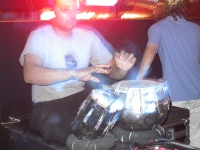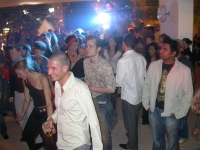
ARE YOU EXPERIENCED?
Bonn Biennale Opening Party with Nasha from London on 13 May 06
 This year´s Biennale in Bonn concentrated on India and had invited the London based British-Asian Nasha Crew for the opening party. An excellent choice as tabla wizard Aref Durvesh, DJs and producers Ges-E and Osmani Soundz proved that night. They prepared the audience mindfully with downtempo tracks featuring Indian vocals or instrumental samples that even made the Indian Embassador in Germany gently move her shoulders. For the partyメs first peak the Nasha crew called everybody to come close to the DJ stage, where Aref Durvesh was sitting crosslegged behind his tablas right next to the 1012s. Then Aref started his solo tabla thunders, caressing, beating his drums, shoving the bass tones with the heel of his hand over the bigger drum, the sounds often altered by Ges-E adding effects on the mixer,
This year´s Biennale in Bonn concentrated on India and had invited the London based British-Asian Nasha Crew for the opening party. An excellent choice as tabla wizard Aref Durvesh, DJs and producers Ges-E and Osmani Soundz proved that night. They prepared the audience mindfully with downtempo tracks featuring Indian vocals or instrumental samples that even made the Indian Embassador in Germany gently move her shoulders. For the partyメs first peak the Nasha crew called everybody to come close to the DJ stage, where Aref Durvesh was sitting crosslegged behind his tablas right next to the 1012s. Then Aref started his solo tabla thunders, caressing, beating his drums, shoving the bass tones with the heel of his hand over the bigger drum, the sounds often altered by Ges-E adding effects on the mixer,
 The audience got as close as possible to see Aref's fingers running over the skins, assuring themselves that this was live and this was Indian, even though it sounded a bit different. Aref beat the crowd literally towards the dance floor and when Osmani Soundz slipped in his rather slow track Village Vibez everybody started to dance ヨ and should only stop at the end of the night. Osmani kept the party going with straight beats, presenting the most wicked beats from the London Eastend and never compromising aesthetically. Then Aref broke in with another tabla solo, very much appreciated by the audience, moving to the tabla beats and longing to party. Aref kept playing tablas alongside the next couple of tracks. Ges-E accelerated the tempo constantly and then the first pure drum&bass track exploded on the floor unleashing the full energy of the dancers. The Nasha Experience had reached their main musical field mixing one heavy Indian flavoured d&b track into the other. They had really seduced the crowd into drum and bass and made the people enjoy the tracks they mostly had never heard before. The smokers foyers leads to a longstretched terrace overlooking the Rhine where you could chill in the cool breeze with the shiny river right in front in you and the hushed party sound from behind.
The audience got as close as possible to see Aref's fingers running over the skins, assuring themselves that this was live and this was Indian, even though it sounded a bit different. Aref beat the crowd literally towards the dance floor and when Osmani Soundz slipped in his rather slow track Village Vibez everybody started to dance ヨ and should only stop at the end of the night. Osmani kept the party going with straight beats, presenting the most wicked beats from the London Eastend and never compromising aesthetically. Then Aref broke in with another tabla solo, very much appreciated by the audience, moving to the tabla beats and longing to party. Aref kept playing tablas alongside the next couple of tracks. Ges-E accelerated the tempo constantly and then the first pure drum&bass track exploded on the floor unleashing the full energy of the dancers. The Nasha Experience had reached their main musical field mixing one heavy Indian flavoured d&b track into the other. They had really seduced the crowd into drum and bass and made the people enjoy the tracks they mostly had never heard before. The smokers foyers leads to a longstretched terrace overlooking the Rhine where you could chill in the cool breeze with the shiny river right in front in you and the hushed party sound from behind.
With their carefully built sets Nasha had developed sophisticated dynamics for the dance floor, always being considerate and friendly to their guests. All the tracks played that night were produced by Nasha themselves and I can assure you they have enough tracks ready to throw a couple of another vibrant parties. This was really an experience.
IMPORT EXPORT
Message from the Dabba Cultural Transfer between India and Germany
 The festival Import Export concentrated on the political implications of cultural transfers and the cultural peculiarities of economic relationships between India and Germany. It was curated by the filmmakers and authors Dorothee Wenner and Merle Kröger, who showed their film "Starbiz" at the festival. The Berlin chapter was the third part of a series, which started in Bombay in March 2005 and then with a stop over in Vienna travelled to Berlin, always a special film programme in the luggage, but varying the conference at each place.
The festival Import Export concentrated on the political implications of cultural transfers and the cultural peculiarities of economic relationships between India and Germany. It was curated by the filmmakers and authors Dorothee Wenner and Merle Kröger, who showed their film "Starbiz" at the festival. The Berlin chapter was the third part of a series, which started in Bombay in March 2005 and then with a stop over in Vienna travelled to Berlin, always a special film programme in the luggage, but varying the conference at each place.
In Berlin a strong subject matter was the representation of the Indian diaspora in Germany, focussing on the informal structures and constructions but not the official relationships on a administrational level. One afternoon concentrated on the internet portal TheInder.net, which celebrated its fifth anniversary in 2005 and serves as a communication platform, playing a prominent role in the communication system for second generation people in general and especially Asians. When in 2000 the German Christdemocratic Party brought up the slogan "Kinder statt Inder" (children instead of Indians), which was then adopted by the right wingers in Germany, Bijon Chatterji and two friends found a quick and significant if not to say signifying answer by establishing theinder.net as a basis for a virtual community based on the principal item - a forum of 1300 users. The online community in long terms only survives when backed by "offline" meetings; this might be the reason why the calendar of events is the most frequented part of the site.
Whereas the second generations Asians built their own communications structures their representation in German TV is no very satisfying. Navina Sundaram works for the German television ARD since 1963, partly for the Weltspiegel (mirror to the world) department. From 2001 to 2005 Weltspiegel broadcasted 11 features on India ranging from the disappointment of the Indian Christian population about the election of the pope, a reportage on Delhiメs new subway or the new built highway between Riapur and Bombay, not touching subjects like the genocide in Gujarat in 2002 or the potential of the emerging economical giant. "So what earlier used to be a political programme focusing on international affairs has of late mutated into a glossy travel magazine." Navina Sundaram sums up. Whereas BBC World or CCN today operate with Indian, African, Asian or Carribean TV presenters originating German television refuses to acknowledge the changes in the German society.
In a very entertaining but as well informative film lecture film critic Menakshee Shedde and film scientist Vince Hediger extracted the German phantasies of India between 1920 and 1960 from three diverse versions of the "Tiger from Eschnapur"§, as the film represent late colonial phantasies of a country with nearly no colonial empire to speak of. In contrast to the orientalism in German literature of the 19th century all three films do not deliver useful information about India. All three films are crammed with exotica and erotica and serve more to construct a positive image of Germany on behalf of India. Significantly all Indians are played by German actors with brown make up whereas the "real" Indians are reduced to postcard sceneries in the background. In their final analysis Shedde and Hediger perceive the three versions as "openly patronising and quite racist."
In contrast to this the German-Indian co-production "Die Leuchte Asiens" directed by Franz Osten and Himansu Rai, worked with an Indian cast for all roles. Import Export presented the very rarely screened film which was produced in 1925. "Die Leuchte Asiens" tells the story of Gautama Buddha and was a great success in mid twentiesメ Germany where Hessesメs Siddharta had already paved the path for the subject matter.
A conference about cultural transfer consequently discusses the effects of globalization. The Bombay based cultural observer Vinay Chodary in his lecture "Message from the Dabba" the manifold possibilities of resistance against the forces of globalisation on a grass root level. A dabba is an aluminium lunch box. Im Bombay the Dabba couriers ヨ the Dabbawallahs ヨ have developed a perfect logistic system by which they pick up the fresh cooked meals in suburban homes, transport them by carts and trains, and deliver them punctually for lunch break to the hungry office workers in the center of Bombay. For Vinay Choudary the Dabbawallah system is an example for intelligent and creative forms on a grass root level to escape to escape the international corporate food dictatorship. Who gets a dabba does not need to go to McDonalds. He also doubts, that the stolid, on monoculture oriented multinational companies in the long run can get a foot on the ground in the Indian market, as it is based on cultural diversities and peculiarities. In a country with 330 million gods universal truth cannot exist.
For Dorothee Wenner and Merle Kröger "it is indisputable that the impact of liberalisation of trade on the live of people is to be documented, reviewed or opposed". But they also see globalisation as a chance "to examine existing ideas that seem to be frozen in well-entrenched values of the north and the south". In their film "Starbiz" they explore the aura of Mercedes Benz in India. The car serves as a vehicle to perceive Indian sights and thoughts about Germany in general but you at the same time you learn as well a lot about India ヨ from an Indian perspective.
The final panel surprisingly focused on a complete different aspect of the conference. The EU financed Import Export or mostly because the wished to support grass root projects. At the same time the regulations for funding were sized on big organisation which are not able to deliver the desired contents ヨ a quite paradox situation. There is a message if not from the dabba but from the grass root basis to the EU to simplify the regulations for the funding of projects from the basis and keep such programmes alive.


